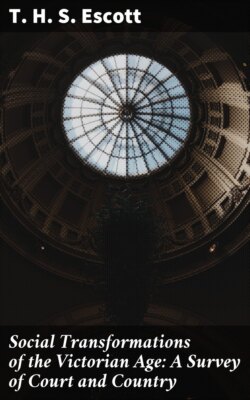Читать книгу Social Transformations of the Victorian Age: A Survey of Court and Country - T. H. S. Escott - Страница 3
На сайте Литреса книга снята с продажи.
PREFACE
ОглавлениеTable of Contents
It may be well very briefly to explain the relation in which the present work stands to a survey, not a history, of modern England undertaken by the same author some years ago. That earlier work was originally published by Messrs Cassell and Co. in two volumes. It was reprinted, first by them, secondly by Messrs Chapman and Hall, in a single volume. Into that re-issue of his England: Its People, Polity, and Pursuits (the labour of revision being much lightened by the obliging help of Mr Francis Drummond), the author introduced certain references to social or legislative changes effected since the original edition of the work appeared. Without organic disturbance of its plan, and risk of consequent confusion to the reader, it would have been impossible to bring down that book to the year 1897. The writer does not in the following pages pre-suppose any knowledge of his former book on the part of the readers of his present one. He has, however, held himself absolved from the duty of repeating in this book minute accounts of institutions fully described in its predecessor. Such repetition seemed the more undesirable because the earlier book is still in wide circulation here; while it has been translated into several European languages, and has been adopted as a text book in the higher grade State schools of Germany,[1] and of other countries. The method of workmanship adopted in Social Transformations of the Victorian Age is identical with that pursued in the case of England, Etc.
This new book being, like its predecessor, not a history, but a series of different views from a common standpoint, the sketches of national life and character as well as of national institutions at work, have in all cases been made from personal observation; supplemented by the assistance of the highest experts in their different departments to whom the writer had access. Often, he is glad to say, the same private friends who helped him in the seventies have been able to renew that help in the nineties. Thus, Sir Charles Dilke, Sir Robert Herbert, Mr Mundella, Mr Archibald Milman of the House of Commons, and Mr Albert Pell have generally and specifically repeated the assistance lent to him twenty years earlier. In most cases it is hoped the assistance given has been acknowledged in its proper place. In many cases the advantages of this service extend beyond any particular passage. In all which relates to the new schemes of local government the writer is particularly indebted to Mr Henry Chaplin or members of his staff; to Sir Henry Fowler; to Sir Charles Dilke; to the Rev. J. Charles Cox, LL.D., of Holdenby, as in ecclesiastical matters to the Rev. A. L. Foulkes of Steventon, and to the Rev. H. W. Tucker, D.D., of the Society for the Propagation of the Gospel. In references to certain phases of social history, especially about the early railway period, he has learned much from Lord Carlingford, Mr Markham Spofforth, Mr J. C. Parkinson, and from Sir W. H. Russell. And finally he would specially thank several gentlemen of the Education Department, as well as the Vice-President himself, Sir John Gorst. It is hoped that, as in the case of the writer’s England, so in that of his new book, the collaboration of those who are, in their different provinces, experts, has ensured a more uniform accuracy than in a volume dealing with such a variety of subjects would otherwise have been attainable.
T. H. S. E.
